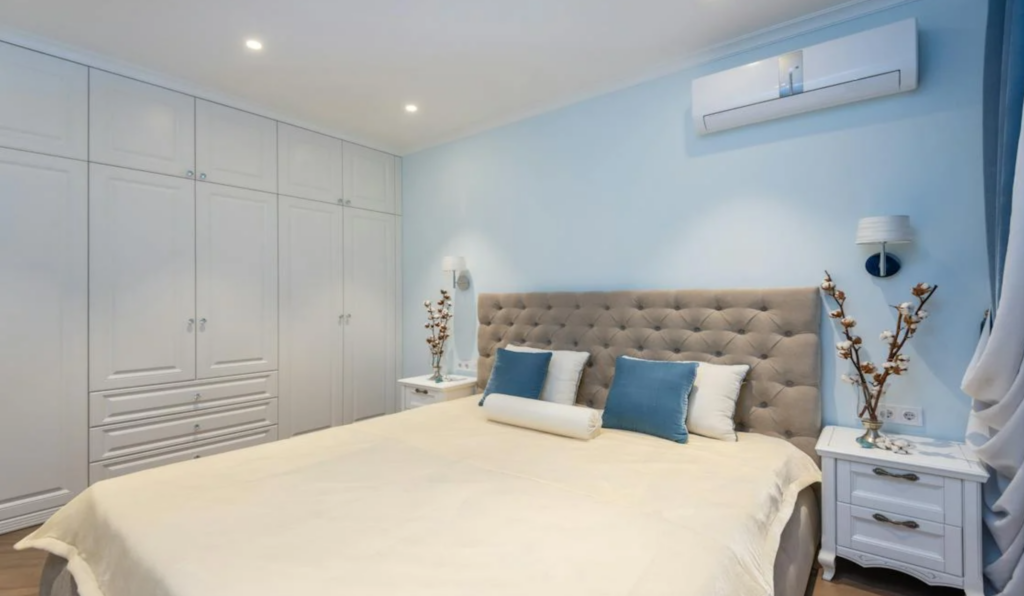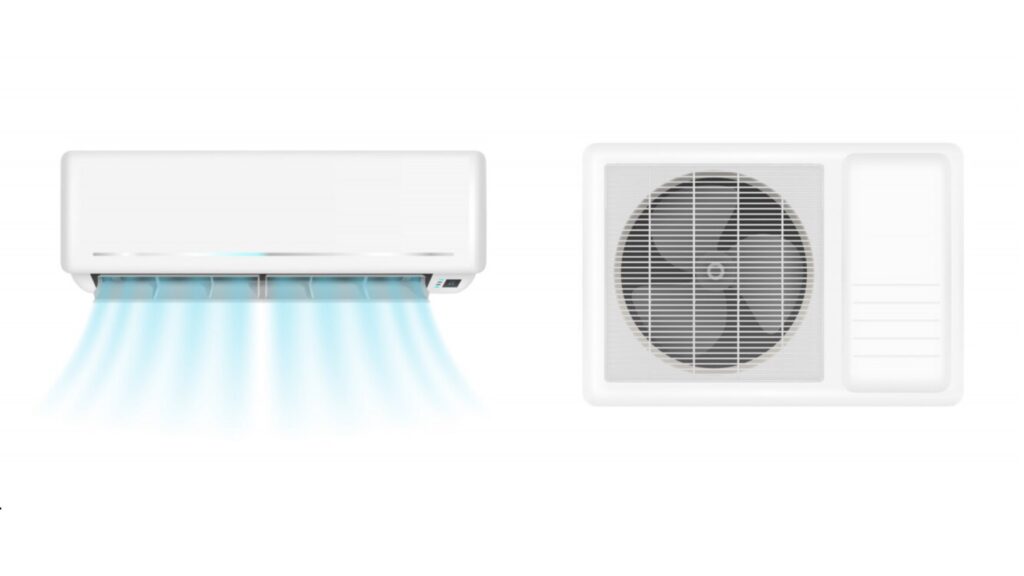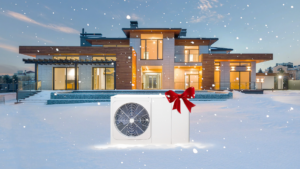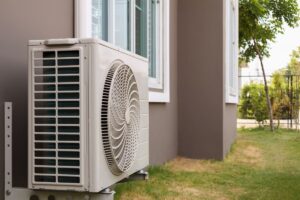Staying cool in the summertime is a constant challenge for many Canadian homeowners. It is important to have a good air conditioner to ensure you are comfortable when the temperatures reach their peak. However, air conditioner units often use a lot of energy, which leads to an increase in utility costs.
Energy efficient air conditioners have become increasingly popular in recent years due to rising energy costs and growing environmental awareness. An energy efficient AC unit can save you hundreds of dollars per year on utility bills while reducing your carbon footprint.
In this article, we will cover everything you need to know about high efficiency air conditioners. We’ll discuss what makes an AC energy efficient, the benefits of upgrading to this type of unit, and the latest technologies. By the end, you’ll understand why a high efficiency air conditioner is worth the investment and how to choose the right one for your home.
What Makes An Air Conditioner Energy Efficient?
An air conditioner’s energy efficiency is measured by its SEER (Seasonal Energy Efficiency Ratio) rating. The higher the SEER rating, the more energy efficient the AC unit is. Most new air conditioners have a SEER rating between 14 and 18. All modern cooling systems must meet a minimum SEER rating of 13 to be eligible for importation into Canada or interprovincial transportation.

The Key Components That Affect An AC’s Energy Efficiency
There are a few elements that can impact an air conditioner’s effectiveness. Here are the key components that affect an AC’s energy efficiency:
Compressor: The compressor is the heart of the air conditioning system. It pressurizes and circulates the refrigerant. More efficient compressors like two-stage and variable speed compressors maximize performance and minimize energy use.
Coils: The evaporator and condenser coils are responsible for heat transfer. Larger coil surface areas improve heat transfer efficiency.
Fans: More efficient fan motors and fan designs like variable speed fans optimize airflow and reduce energy consumption.
Refrigerant: The refrigerant used also impacts energy efficiency. R410A is an eco-friendly refrigerant commonly used in newer, efficient ACs.
Thermostat: A programmable or smart Wi-Fi-enabled thermostat optimizes runtimes and helps maintain efficient temperatures.
Air Sealing: Minimizing air leaks and duct sealing improves AC performance and prevents cooled air from escaping.
When shopping for a new energy efficient AC, look at its SEER rating, compressor type, coil design, fan motor and blades, refrigerant, and thermostat capabilities. Units with these high efficiency components deliver superior comfort while using less electricity.
Benefits Of An Energy Efficient Air Conditioner
Buying an energy efficient air conditioner can provide many benefits beyond just staying cool in the summer. Here are some of the top advantages of choosing an energy efficient AC unit:
Cost Savings: Energy efficient air conditioners can greatly reduce your electricity bills compared to older, less efficient models. Newer ACs require significantly less energy to produce the same amount of cooling. This translates into lower monthly costs and savings of hundreds of dollars per year on your utility bills.
Environmental Impact: Energy efficient ACs are much better for the environment. They reduce greenhouse gas emissions and demand for fossil fuels. Widespread use of high efficiency ACs can have a measurable impact on reducing pollution and fighting climate change.
Rebates and Incentives: Many utility companies and federal agencies offer generous rebates, tax credits, and other incentives for purchasing an Energy Star certified high efficiency AC. Taking advantage of these can offset 30-50% of the upfront cost of a new energy efficient air conditioner.
Comfort: Newer energy efficient ACs provide greater comfort during the hot summer months. They remove humidity from the air more effectively, have improved filtration, and distribute air more evenly. You stay cooler at higher set temperatures, while avoiding the constant blast of really cold air from older units.
Newest Energy Efficient AC Technologies

Air conditioning technology has improved dramatically in recent years, with several exciting new innovations that can dramatically improve energy efficiency. Here are some of the newest technologies to look for when shopping for an energy efficient air conditioner:
Inverter Compressors
Traditional ACs have compressors that are either on or off, constantly turning on and off to maintain the desired temperature. This ends up using more energy overall. Inverter compressors ramp up and down to provide just the right amount of cooling needed. By more precisely matching cooling output to demand, inverter compressors can use up to 30% less electricity than traditional compressors.
Smart/Connected ACs
The newest AC units have smart technology built in to connect to your home Wi-Fi and allow control from your smartphone. This allows you to more closely monitor energy use and make adjustments on the fly even when away from home. Smart ACs also have sensors and algorithms to learn your usage patterns and optimize cooling throughout the day.
Zoning
Many high-end air conditioners now offer zoning capabilities. This allows you to set different target temperatures in different rooms or zones of your home. You can keep rarely used rooms warmer while maximizing comfort in occupied spaces. This avoids wastefully trying to cool your whole home to the same temperature.
Variable Speed Fans
Advanced controls allow newer ACs to vary the speed of internal fans. This allows them to move just the right amount of air to provide cooling without wasting excess energy at full blast or being too weak on low fan speeds. Variable speed fans provide just the airflow needed for optimal comfort and efficiency.
Tips For Maximizing Energy Efficiency

When shopping for a new high efficiency air conditioner, proper sizing is crucial. An oversized AC will cycle on and off frequently, preventing it from properly dehumidifying the air. An undersized unit will struggle to cool your home, running constantly at max power. Work with an HVAC professional to determine the appropriate BTU rating based on square footage and other factors like window area and insulation.
Regular maintenance is also key for energy efficiency. Replace filters monthly during peak usage seasons. Annual professional tune-ups ensure refrigerant levels are optimized, coils are cleaned, and parts are lubricated. Neglecting maintenance can lower efficiency by up to 5%.
Install a programmable thermostat to set temperatures higher when away or asleep. Homeowners can receive savings of up to 10% annually from properly using programmable thermostats. Models with smart home connectivity allow remote temperature adjustments.
Simple upgrades like sealing ducts or adding insulation improve efficiency. Strategic landscaping provides shade to reduce solar heat gain. Close blinds and curtains during the hottest parts of the day. An energy audit can identify areas for efficiency improvements.
By properly sizing, maintaining, and using programmable features, today’s high efficiency air conditioners can provide cool comfort while minimizing energy costs. Careful home upgrades and smart usage habits maximize savings.
Top Energy Efficient Air Conditioner Brands
When shopping for a new energy efficient air conditioner, you’ll want to look at some of the top brands that offer high efficiency models. Here are some of the leading options to consider:
Carrier
Carrier is one of the most well-known and popular AC brands on the market. They offer a full range of central air conditioners and heat pumps, with efficiency ratings up to 21 SEER. Some of their best high efficiency models include the Carrier Infinity 21 Air Conditioner.
Trane
Like Carrier, Trane is another big player in the HVAC industry and offers a breadth of energy efficient air conditioning units. One of their top models is the Trane XV20i, which reaches up to 20 SEER. The Trane AC uses intelligent controls and variable speed compressors to achieve one of the highest efficiency ratings available today.
Lennox
Lennox is another reputable, leading brand that offers elite energy efficient air conditioners. One of the most efficient models they offer is the Lennox Signature XC25. This top tier AC achieves industry leading 25 SEER energy efficiency ratings.
Other Top Brands
In addition to those major brands, companies like Rheem, York, Goodman, and Bryant also offer energy efficient AC models ranging from 14 to 21 SEER. Checking for the Energy Star logo is an easy way to confirm any AC unit meets strict efficiency guidelines. Consulting with HVAC professionals can help determine the right brand and model to suit your needs and budget.
Estimated Costs

The cost of purchasing and installing a new energy efficient air conditioner can vary significantly depending on the size, features, and efficiency rating you select. Here is an overview of the range of costs:
Window ACs: These are the most affordable type of energy efficient AC, ranging from $150 for a basic 5,000 BTU unit up to $800 for a high-end 24,000 BTU smart AC.
Portable ACs: Portable ACs that can be moved room-to-room start around $300 for an 8,000 BTU model and go up to $1,000 for a 14,000 BTU unit. Installation only requires venting the hot air exhaust hose out a window.
Mini Split Ductless Systems: These run from $1,000 to $4,000 depending on the BTU rating and number of indoor heads. Installation costs another $1,000-$3,000 for hiring an HVAC technician to mount the wall-mounted indoor unit and outdoor condenser.
Central ACs: High efficiency central air conditioners range from $3,000-$7,000 depending on the size of your home. Installation costs are another $1,000-$5,000 depending on the complexity to connect ductwork and electrical.
Smart/Wi-Fi Capabilities: Adding smart features and Wi-Fi connectivity adds $50-$300 to the total cost. Some advanced systems with zoned climate control can cost $1,000+.
Additional costs to consider include extended warranties up to 10 years which can add a few hundred dollars, and recycling/removal of an old AC unit if replacing an existing one. Also factor in enhanced rebates of $100-$500 for choosing an Energy Star Most Efficient certified AC model.
Overall, the total investment for a high efficiency air conditioner ranges widely from a couple hundred dollars for a basic window unit up to $10,000+ for a large, advanced central air system. Focus on choosing the right size, features, and efficiency rating for your home’s needs.
Rebates And Incentives
Many utility companies and local governments offer rebates, tax credits, and other financial incentives for installing energy efficient air conditioners. Taking advantage of these programs can help offset the typically higher upfront costs of energy efficient models.
Some of the main types of incentives available include:
Federal tax credits – The federal government offers tax credits that cover 10% of the cost, up to $500, for installing certain high efficiency central air conditioners and heat pumps.
Utility rebates – Many electric and gas utilities offer rebates ranging from $25 to $500+ for installing energy efficient air conditioning equipment. The rebate amount is usually determined by the unit’s SEER rating.
Financing incentives – Special financing programs with low interest rates or 0% interest introductory periods are sometimes available to help cover the initial cost of new efficient ACs.
Bulk purchasing discounts – Some utilities offer discounts on high efficiency ACs when multiple homeowners in a neighborhood purchase and install them at the same time.
Smart thermostat rebates – Installing a smart thermostat along with the new AC may qualify for additional rebates of $25-$100 in some utility territories.
Provincial Smart Home Services can help you find out what incentives and rebates you are eligible for after upgrading to an energy efficient air conditioner. Contact one of our expert energy advisors and they will be able to answer any questions you might have.
Conclusion
As we’ve covered, energy efficient air conditioners offer numerous benefits compared to standard models. By choosing an Energy Star certified AC unit with a high SEER rating, you can save significantly on your electricity bills during hot summer months. The most energy efficient models utilize innovative compressor designs, variable speed operation, and smart technology to minimize wasted energy while cooling your home effectively.
Related Posts

A Guide to Heating Rebates and Energy Rebates in Canada
Everything you need to know about energy and heating rebates in Canada as we move towards the end of the year.

Win a Free Heat Pump this Holiday Season!
We are thrilled to announce our exciting holiday promotion where you have the chance to win a free heat pump system.

How to Pick the Best HVAC System for Your Household
We explore how to choose the best HVAC system for your household, discussing things like home size, HVAC type, and cost requirements.


No Comments